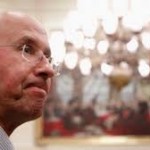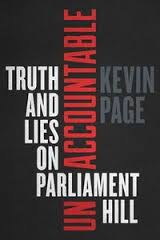[Last night, the Ottawa Writers Festival took me on a road trip to Rwanda with Canadian humorist Will Ferguson. Wait. What? Rwanda? Humour? Yes, both, and it was superb. SPOILER ALERT: Rwanda has more to it than machetes and murder. (Gorillas. Mountains. Peace. Progress. More females in government than in your country.) Rwandans laugh. They remember. They change. It’s not still 1994 there, even if it is in most of our minds. But speaking of thought, I haven’t even told you about the previous WriteFest journey I went on, which stayed much closer to home.]
Speaking of public radio, and public spaces, and public service – as often happens around my little corner of the globe – I was in a sacred place last week where service to the common good was extolled with the help of a radio star that video couldn’t kill. (It probably helps that Alan Neal might be part hobbit.)
The SPACE: Centretown United Church is a lovely old stone building about 10 bus stops from Canada’s Parliament. Churches give some people the creeps, sometimes with good reason – desperately resisting the temptation here to mention what happened in Rwandan churches – but the UC is a benevolent and remarkably open-minded Canuck institution, and this place gets a different but complementary dose of the sacred whenever the Ottawa Writers Festival takes it over. Stained glass, hard benches, bright light at sundown, elevated and inspiring conversation. And BOOKS. (Another flavour of heaven, though as my father-in-law muttered afterward, “I don’t know what Pierre Berton was thinking when he called his book The Comfortable Pew. Had he ever sat on one of these things?” Irony can be fun.)
The RADIO: An interview with the evening’s author had already been done on CBC Radio 1’s local afternoon show, but the cherubic and funny Alan Neal was glad to recapitulate his conversation with Kevin Page for a live, though clearly greying, audience. It was like public radio in a really big studio, and was punctuated by the duo’s mock competitition to see who could insert more promos: the host at “All-in-a-Day-at-91.5-FM-in-Ottawa” or the writer “flogging my book Unaccountable”. I declared a tie. They made a good comedy team in the context of what could have been a very dry and earnest conversation. It gave bureaucrats (and public radio) a good name.
The PUBLIC SERVICE and its SERVANT. Kevin Page became an unlikely centre to a surprising storm of Canadian attention. A self-professed “bean-counter”, this long-time economist within the Canadian federal public service became Canada’s first Parliamentary Budget Officer in 2008. “Nobody else wanted the job,” he claims. It would seem to be a rather grey and readily-ignorable position; certainly, the sitting government during his tenure would have preferred that it remain so. However, described by one journalist as “a guy who just has trouble fudging things”, Page acquired enemies and a startling (even to him) notoriety by publicly questioning or criticizing the government’s budgetary process, its philosophy, even its basic accounting. (They said: These fighter planes will cost $10 million apiece. He said: Um, really? Would you believe, $25 million?)
Ottawa is a government town. I wonder what kind of crowds Kevin Page can draw in other parts of Canada for his “Accountant in Wonderland” memoir Unaccountable, but Centretown United was a full house for his discussion of his five years as PBO. He’s a lean, wire-rimmed, shaved-bald bureaucrat, and I thought afterwards, Why can’t somebody like THIS be elected to lead in our country? (Without going into an extended rant about a “lamentably defective” political system, I am overly aware of why he couldn’t win – baldness is just the beginning, to say nothing of difficulty in “fudging things” – and of why he wouldn’t want to even try.) In the meantime, I had an idiosyncratic positive bias: right from my first glance at him as he came in the back of the church, he looked tremendously like my buddy Craig. He proved to speak and carry himself in quite a similar way: he has the same way of saying important things in crisp, matter-of-fact ways, laconic – even wryly comic – on the outside but deeply serious beneath. Like Craig, he’s a former jock and coach; I could tell from his plain but non-corporate invocations of leadership and how to “build a culture”, all delivered in ways that any thoughtful sports-lover would recognize. He’s highly principled, a quietly great man, wildly admirable despite his understated I-just-hired-great-people-and-went-golfing tone. (I later learned that he was a scholarship golfer in university, and even in pressure-packed jobs routinely continued to coach his kids and others. One former colleague even accused him of being able to maintain the mythic “work-life balance”, speaking of heroism.)
What’s happening to our institutions? the alleged bean-counter wants to know. After an earlier minority government stint, the ruling Conservatives, cited for “contempt of Parliament” by the Speaker of the House of Commons, went back to the Canadian electorate for a vote nobody except the governing party even remotely wanted. The Tories returned with a majority in 2011.¹ “We as a nation,” Kevin Page lamented, “validated their approach [to governing].” That approach has included the muzzling of government scientists and the dismantling of consultative forums, the budgetary and administrative strangling of the CBC, and a general devaluing of the federal civil service.
It’s a weird country, an oddball world – and one that an Ottawa audience knows too bitterly and too well – in which being a “public servant” is routinely derided and devalued. (I was a teacher for a long time. Echoes.) What, service to the common good is a bad thing? I guess maybe it can be if maxing-out by businesses and individual taxpayers – the Conservatives, for instance, never use “citizen”, that noble and neglected word – has become the supreme value. (And, it must be said, if public service unions have themselves too often appeared to be in the “self-service” business.)
¹ The Liberals got electorally crushed in 2011 in a way that this “natural governing party” of Canada had never been. Its leader, Michael Ignatieff, was a noted thinker, academic, essayist, and an award-winning novelist. Coincidence? He certainly wasn’t much of a sound-biter.)
The guiding premise of the public service, in a Parliamentary context, has been described as “loyal implementation and fearless advice”: loyal, that is, to the public good; fearless, that is, in guiding those elected to powerful positions to do the ethical and substantial thing, not the short-term, cosmetic or ideological fix. In Page’s view, most dramatically in the current Conservative mandate but not only theirs, this maxim has been turned on its head. The public service has been expected to fearlessly implement policies that lead to selfish and narrow-minded approaches to citizenship and to Canadian engagement in the wider world. Meanwhile, civil servants have also been increasingly required to advise the government in merely “loyal” ways that agree with its political and power-maintenance objectives.
“We need to take the shackles off the public service,” Page argues, which “is always a leadership issue….Public service renewal is about values.” Canada is famous for its Royal Commissions, which are sometimes held up as costly alternatives to actually changing the country, and are sometimes seen as governmental shorthand for put that issue so far on the back burner that we don’t even notice when it boils dry. Our most recent, a Truth and Reconciliation Commission on Canada’s historical mistreatment of Aboriginal peoples, has renewed a national conversation, but how much change will occur as a result? Page is clear, though, that they are sometimes indispensable: “We need a Royal Commission on institutions. We don’t fix climate change, Aboriginal issues or national healthcare without strong, aggressive institutions.”
“Please INSPIRE us!” This, according to Page, is what the federal public service, as one of those institutions, most wants and needs from its elected masters. (Or teachers lack from their leadership. Or as players yearn for from their coaches, children from their parents, and all of us from whatever mentors we have sought or found.) The accountant as visionary? Never expected to write that phrase, my preconceptions being what they are, but Kevin Page, for five years Canada’s National Counter of Government Beans, fits that bill. I’m curious to know if his book, and his voice, will be part of a renewal of the ethics and the practice of the civil service, or will disappear from thoughts and minds faster than the most opaque federal study, or last Friday’s lunch.


